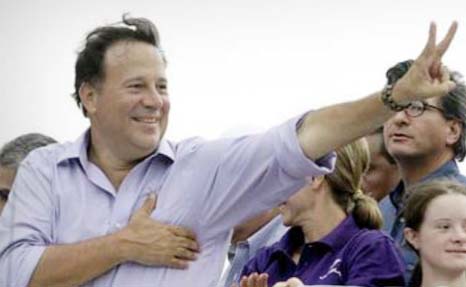
AFP, Panama City :
Panama’s President Juan Carlos Varela assured his French counterpart Francois Hollande on Friday his country was committed to cooperating in the fight against money laundering, his office said.
Varela, whose government is reeling from the so-called Panama Papers leaks, spoke with Hollande by phone after France said it was putting his country back on its list of those that do not cooperate in efforts to track down tax dodgers.
Varela emphasized Panama’s “commitment to continue cooperating with the international community in the fight against the improper use of financial and corporate services,” the presidency said.
Hollande for his part “strongly encouraged” the Central American country to respond to information requests from French tax authorities and begin automatic data-sharing “as quickly as possible,” his office said.
Earlier, the French finance ministry officially returned Panama to its list of Uncooperative States and Territories (ETNC), four years after removing it following a bilateral deal on fighting tax evasion.
Varela has been left battling for his nation’s reputation after millions of documents leaked from Panamanian law firm Mossack Fonseca lifted a veil on how rich, powerful and sometimes criminal figures worldwide are channeling offshore financial dealings through Panama.
The Panamanian leader insisted his government had made “important progress” on “strengthening” the country’s financial services sector, but pledged to take steps to guarantee the full implementation of the deal with France. The two presidents agreed to set up a meeting of their finance ministers in the coming days, Varela’s office said.
Meanwhile, Panama will focus on diplomacy with France following a standoff over a mass data leak dubbed the “Panama Papers,” President Juan Carlos Varela said after speaking with his French counterpart Francois Hollande.
France announced it would put the Central American nation back on its blacklist of uncooperative tax jurisdictions, following a major leak of documents from a Panamanian law firm.
Panama had at first warned it could retaliate, but the president said on Friday he prefers a diplomatic solution and would not seek “retorsion measures.” “The step taken by the French government is wrong and unnecessary,” Varela told reporters. “(But) first we are going to use diplomacy, dialogue and cooperation.”
He said Panama’s finance minister will fly to Paris next week to discuss cooperation.
French companies like transport group Alstom SA have several pending deals in the country, such as building new cars for the Panama Metro.
Asked whether France’s decision on the blacklist would affect these deals, Varela said: “When I’ve had to act firmly, I have done it, but I’m a person who prefers to avoid confrontation… and you must practice what you preach.”
Panama’s President Juan Carlos Varela assured his French counterpart Francois Hollande on Friday his country was committed to cooperating in the fight against money laundering, his office said.
Varela, whose government is reeling from the so-called Panama Papers leaks, spoke with Hollande by phone after France said it was putting his country back on its list of those that do not cooperate in efforts to track down tax dodgers.
Varela emphasized Panama’s “commitment to continue cooperating with the international community in the fight against the improper use of financial and corporate services,” the presidency said.
Hollande for his part “strongly encouraged” the Central American country to respond to information requests from French tax authorities and begin automatic data-sharing “as quickly as possible,” his office said.
Earlier, the French finance ministry officially returned Panama to its list of Uncooperative States and Territories (ETNC), four years after removing it following a bilateral deal on fighting tax evasion.
Varela has been left battling for his nation’s reputation after millions of documents leaked from Panamanian law firm Mossack Fonseca lifted a veil on how rich, powerful and sometimes criminal figures worldwide are channeling offshore financial dealings through Panama.
The Panamanian leader insisted his government had made “important progress” on “strengthening” the country’s financial services sector, but pledged to take steps to guarantee the full implementation of the deal with France. The two presidents agreed to set up a meeting of their finance ministers in the coming days, Varela’s office said.
Meanwhile, Panama will focus on diplomacy with France following a standoff over a mass data leak dubbed the “Panama Papers,” President Juan Carlos Varela said after speaking with his French counterpart Francois Hollande.
France announced it would put the Central American nation back on its blacklist of uncooperative tax jurisdictions, following a major leak of documents from a Panamanian law firm.
Panama had at first warned it could retaliate, but the president said on Friday he prefers a diplomatic solution and would not seek “retorsion measures.” “The step taken by the French government is wrong and unnecessary,” Varela told reporters. “(But) first we are going to use diplomacy, dialogue and cooperation.”
He said Panama’s finance minister will fly to Paris next week to discuss cooperation.
French companies like transport group Alstom SA have several pending deals in the country, such as building new cars for the Panama Metro.
Asked whether France’s decision on the blacklist would affect these deals, Varela said: “When I’ve had to act firmly, I have done it, but I’m a person who prefers to avoid confrontation… and you must practice what you preach.”

